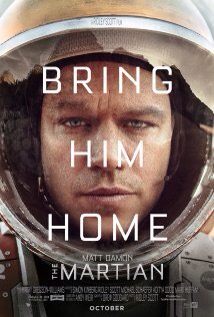One of most popular movies of the summer was Matt Damon in “The Martian.” I won’t try to tell you about it, because you’ve propably already seen it. And besides, I haven’t.
I intend to. In fact, it’s one of the movies I have looked forward to the most. But, my movie watching is definitely not typical. First, though, the reasons I’m excited to see it and have been anxious to see it since the first previews came out.
Matt Damon – I enjoy his everyman personas. Goodwill Hunting set the stage for it. His character was the smartest guy in the world and all he wanted to do was hang out with his friends in Boston. If there was one person to be stranded alone with on a deserted planet, it would be him. Except that if you were strnaded with him you wouldn’t be alone and this part just got weird.
Mars – I’ve always been a science fiction and science fact fan. I still remember watching the first space shuttle landing. Not the orbiter, the glider that they built to test the landing ability. They named that one Enterprise, after the ship in Star Trek. Interestingly in Star Trek canon, the USS Enterterprise was originally named after the space shuttle. So we have art imitating life imitating art. Anyway, the pilots of that first test flight were Crippen and Young. I’m anxious for us to go to Mars, and then beyond. I don’t know that we will ever be able to escapte the solar system, but we can certainly expand beyond a single point of failure when it comes to planets.
What seems to set “The Martian” apart is the author and filmaker’s attention to science. While I love Star Wars, Star Trek and other movies that allow characters to go shooting across the galaxy, the reality is that it’s impossible given what we currently know about science. I don’t mean to say just that we don’t know how to make a ship fast enough to span the stars. We don’t how to make anything go fast enough to span the stars. Warp drives, hyperdrives, transporters. They truly are the stuff of science fiction, not science fact.
Arthur C. Clarke (He wrote 2001 Space Odyssey) said it’s much easier to write a story set 500 years in the future than it is to wrote a story set 50 years in the future. Near future real science keeps overtaking what the writers can dream up.
It’s why I enjoy Ben Bova’s books. He grounds them in near future science. He did two books on the Red Planet, “Mars” and “Return To Mars.”
Science – That’s really the other draw to “The Martian” for me. Because I’m excited about the day we figure out how to put explorers on Mars, I’m equally excited to see a possible example. I have to admit there are certain parts I’ll be watching for specifically. Do they solve the free hydrogen issue? Do they address the change in gravity? Do they have to deal with the vitamin C problem?
Yes, I’ll have to wait and see.
When will I see?
Well, we have discount theaters in my town, a lot of them. Last weekend I finally saw “Jurrasic World” and paid $4 to get in. “The Martian” isn’t there yet.
Rodney M Bliss is an author, columnist and IT Consultant. His blog updates every weekday at 7:00 AM Mountain Time. He lives in Pleasant Grove, UT with his lovely wife, thirteen children and grandchildren.
Follow him on
Twitter (@rodneymbliss)
Facebook (www.facebook.com/rbliss)
LinkedIn (www.LinkedIn.com/in/rbliss)
or email him at rbliss at msn dot com(c) 2015 Rodney M Bliss, all rights reserved
